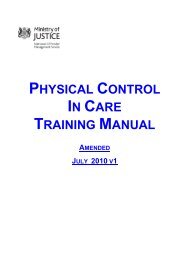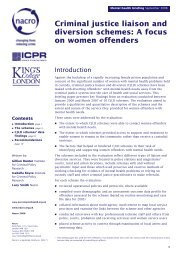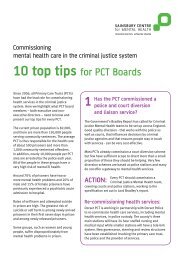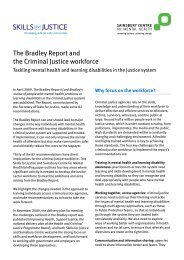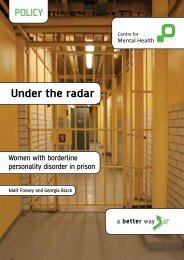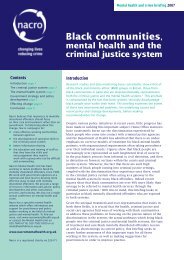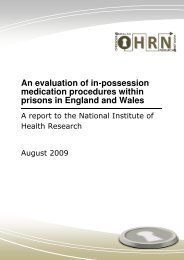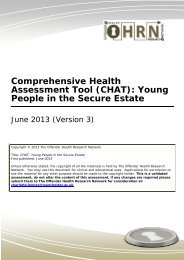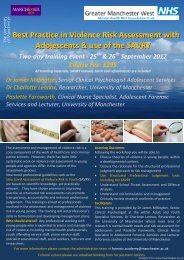Engendering Justice - from Policy to Practice - The Fawcett Society
Engendering Justice - from Policy to Practice - The Fawcett Society
Engendering Justice - from Policy to Practice - The Fawcett Society
- No tags were found...
Create successful ePaper yourself
Turn your PDF publications into a flip-book with our unique Google optimized e-Paper software.
I feel that women with severe mental health problems areneglected. I often come across women who I feel shouldnot have been processed via the criminal justice systembut who should have been immediately redirected <strong>to</strong>secure hospital facilities. <strong>The</strong> severe lack of secure femalehospital beds in the UK also impacts upon the speed withwhich these women can be transferred <strong>from</strong> prison <strong>to</strong>hospital. 56Staff were concerned at their limited options. “A lot offemales have mental health issues and clearly should not bein prison as most of the officers that have <strong>to</strong> manage themdo not have mental health training.” 57<strong>The</strong> Criminal <strong>Justice</strong> Liaison and Diversion Schemes,discussed earlier in this chapter, should developrelationships with teams in female prisons so that supportcan be provided <strong>to</strong> offenders in need. <strong>The</strong> Commissionalso recommends that training is provided <strong>to</strong> prison staffin relation <strong>to</strong> mental health needs and that qualified mentalhealth professionals are recruited <strong>to</strong> provide this trainingand <strong>to</strong> offer around-the-clock guidance for staff. At thevery least, one trained mental health nurse or social workershould be on duty at all times.While further steps must be taken <strong>to</strong> safeguard the lives ofwomen in prison, the real answer lies in diverting women<strong>from</strong> prison in the first place. Prison should not be used <strong>to</strong>contain self-harm, suicide attempts and mental illness. AsDeborah Coles, Co-Direc<strong>to</strong>r of INQUEST stated “Unlessmore women are diverted <strong>from</strong> prison the increase in selfinflicted deaths and the associated high levels of self harm,mental distress and family disruption will continue.” 58When deaths in cus<strong>to</strong>dy tragically occur, support shouldbe provided <strong>to</strong> the families of these women. <strong>The</strong> Cors<strong>to</strong>nReport recommended that public funding be providedfor bereaved families <strong>to</strong> cover legal representation atinquests relating <strong>to</strong> deaths in state cus<strong>to</strong>dy and travel,accommodation and subsistence <strong>to</strong> attend the inquest.This funding should not be means tested. <strong>The</strong> Commissionis concerned that the Government has rejected thisrecommendation and strongly reiterates that funding shouldbe provided <strong>to</strong> these families.Women with ChildrenIt’s my children – they are my biggest concern becauseI’ve not spent a day away <strong>from</strong> them since they were born.I was still breast feeding my baby when I came in here.<strong>The</strong> judge didn’t care. My baby wasn’t used <strong>to</strong> bottled milkand he wouldn’t take any milk for 2 days. I applied <strong>to</strong> themother and baby unit when I first came in; the panel sits inJanuary. When I came in<strong>to</strong> cus<strong>to</strong>dy there were no facilities<strong>to</strong> express milk. I think me being in prison has mentallyaffected my children. My son’s school work has suffered.I didn’t get the chance <strong>to</strong> explain <strong>to</strong> him that I was coming<strong>to</strong> prison. It happened so fast. He started wetting the bedand it’s affected his school work.Female Offender, Questionnaire Response, January 2009It is estimated that up <strong>to</strong> 17,700 children each year areseparated <strong>from</strong> their mothers due <strong>to</strong> imprisonment and tha<strong>to</strong>nly 5 percent of the children of women offenders remainin their own home once their mother has been sentenced.At least one third of women offenders with children are loneparents prior <strong>to</strong> imprisonment. 59 Evidence presented <strong>to</strong> theCommission revealed that separation <strong>from</strong> their childrenand concerns over how the imprisonment was affectingtheir children was paramount for many women offenders.As one mother <strong>to</strong>ld Birth Companions (see box next page):If it is inevitable that pregnant women and mothers have<strong>to</strong> be sent <strong>to</strong> prison, then the Court should take thepregnancy, the children and the length of separation in<strong>to</strong>consideration. Because when mothers are separated<strong>from</strong> their babies and children, the children suffer .60Maintaining family ties through visits and other contact isvery important for these women and their children. Firstnight procedures and induction must provide an opportunityfor women <strong>to</strong> identify concerns about children or anyvulnerable adults in their care and phone calls should beallowed on reception <strong>to</strong> family members. First night incus<strong>to</strong>dy initiatives such as that run by the Prison Adviceand Care Trust (PACT) are particularly useful <strong>to</strong> reduce theanxiety faced by female prisoners and <strong>to</strong> decrease the riskof self harm or suicide and should be introduced across thefemale prison estate.Page 33



